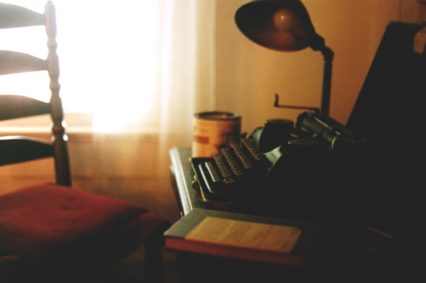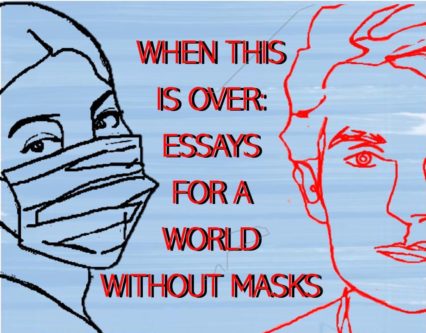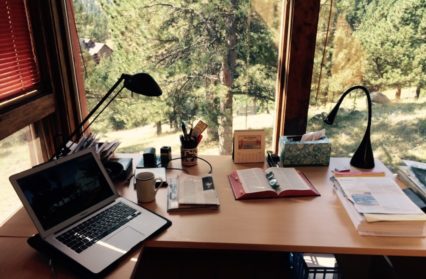Wales Arts Review asked some of Wales’s top writers to pen some thoughts on the future. This new series brings together a wide variety of perspectives and ideas in a vibrant array of styles and forms, expressing hopes for a new way of doing things when the Covid-19 coronavirus is finally overcome. Political, personal, sociological, ecological, cultural – this is an evolving tableau of ideas. Here, Natalie Ann Holborow discusses the value of social interaction and dispels the ideals of the lone writer in favour of a collective future where thinking and feeling deeply take precedence over hyper-productivity.
I sweep anti-bac wipes over the laptop, rub at last the crumbs from between the keys, prop an aloe vera plant for good measure beside the keyboard to keep the room feeling light and fresh. Light every vanilla-sickly candle and watch joss sticks unspool their cloying fumes from the shelf.
I pour a glass of pinot noir and await the lightning bolt of inspiration.
Inspiration doesn’t come. Instead, I fall asleep while watching Fleabag for the third time on the cracked screen of a Samsung with my fist wedged inside a tube of Pringles.
 This, surely, should be a chance to embrace the solitude and space every writer deems necessary to produce that elusive masterpiece. A room of one’s own. An abundance of time during the weekends which we are no longer tempted to fill with social obligations, weekends away, work conferences or performances. I have been blessed with the perfectly valid reason that to attend a friend’s Abba-themed housewarming party would be to break the law; to venture into a shopping precinct to purchase outrageous evening dresses an act of criminal proportions.
This, surely, should be a chance to embrace the solitude and space every writer deems necessary to produce that elusive masterpiece. A room of one’s own. An abundance of time during the weekends which we are no longer tempted to fill with social obligations, weekends away, work conferences or performances. I have been blessed with the perfectly valid reason that to attend a friend’s Abba-themed housewarming party would be to break the law; to venture into a shopping precinct to purchase outrageous evening dresses an act of criminal proportions.
So why aren’t I writing?
Writers have long been perceived as self-confessed loners, toiling endlessly at their words in quiet, wood-panelled studies, perpetually lighting cigarettes and muttering sentences under their breath. Outsiders.
Geniuses, in some cases, but outsiders.
Yet, if you think about your work at the start of your writing career compared to now, how much of your growth as a writer has been shaped solely by yourself – and how much of it has been influenced by others?
We are led to imagine, always, that to be away from the desk is to detract from the important bit: the act of writing itself. We believe now that we are no longer spilling from taxis on Saturday nights, or obligated to attend a family birthday of an aunt who ritually insults us every year at a table for twenty-two at the local Harvester, we finally have that precious time to finish that novel. There may be extra hours in the evening, now that the commute is saved. No shopping because some of us may live in a house of panic-buyers, in which case probably have enough bags of basmati rice to sustain the next three generations. Here’s to another entire, sprawling, utterly undisturbed weekend, perfectly engineered to create a masterpiece.
 I don’t remember writing ever being this hard. The set-up is seemingly perfect: desk, space, time. Articles try to convince me I have less obligations, less distraction, despite working full-time. I can’t pretend there’s no writing material. We are living during a crisis where going to Tesco means battling to death over the last carton of milk. Time outside is assigned by the government, measured out in strict doses. To pop in to see my mother would be to act recklessly. It’s a ready-made dystopian novel (its title, surely, must go by the name of Unprecedented or These Strange Times).
I don’t remember writing ever being this hard. The set-up is seemingly perfect: desk, space, time. Articles try to convince me I have less obligations, less distraction, despite working full-time. I can’t pretend there’s no writing material. We are living during a crisis where going to Tesco means battling to death over the last carton of milk. Time outside is assigned by the government, measured out in strict doses. To pop in to see my mother would be to act recklessly. It’s a ready-made dystopian novel (its title, surely, must go by the name of Unprecedented or These Strange Times).
For too long I have been led to romanticise the Emily Dickinson existence as a writer’s paradise: a lone novelist, hunched over a laptop, curtains drawn; a poet, scaling the horizons with notebook in hand, pausing to observe a brief flush of starlings in some remote stretch of countryside; a nervous playwright, muttering quietly with the door shut, trying to forge fire from dialogue.
What I have discovered instead is that the fluidity of creative thought has been made rigid, stiffened with shock. It dawns on me, as I swing open the window latch to feel the crisp air on my skin, that we are not merely writing machines.
We are humans, collectively grieving.
It’s too easy, in general discourse about writers and writing, to overlook the importance of other people as essential to our development. Yet, it is these exact human interactions we deem a distraction that are the very lifeblood of our words.
It takes a global crisis to realise it.
I’m not here to tell you that just because Shakespeare, or Salvador Dali, or any other creative genius managed to write a masterpiece whilst in isolation, means that you can too if you simply get on with it and start creating. I’m not here to spring about on the balls of my feet like some hyperactive life coach, roaring at you to just ‘believe in yourself!’; that you can produce something phenomenal if only you eliminate that pesky self-doubt and bleed your feelings out onto the page.
Apart from the one exercise session a day, which sometimes you may not have the energy, nor indeed motivation to muster, there is little else to look at than those same tired walls around you. There is not nearly the same level of human interaction that can normally spark inspiration within you; whether that’s an intriguing conversation overheard in a crowded cafe, or a breathtaking view somewhere far off the beaten track. Like little dogs, we walk or run the same blocks daily in regimented blocks of time.
The muse, meanwhile, continues to social distance itself.
Once this horror is over, whenever that may be, I hope we emerge, blinking and stunned into a world we no longer expect to be hyper-productive, rigidly disciplined writing machines. I hope we talk deeply, feel intensely, and acknowledge the value of human interaction. Some of us may have lost loved ones, or we may ourselves have touched death. Some of us may be battered and bruised mentally, looking for something to grasp amongst the wreckage. I hope we are unafraid to hold each other close, to travel farther than the confines of a small village or the garden fence, to live fully and to trust that the ability to write will always be there waiting for us to return with new stories.
Rainer Maria Rilke once wrote:
Whether it be the singing of a lamp or the voice of a storm, whether it be the breath of an evening or the groan of the ocean — whatever surrounds you, a broad melody always wakes behind you, woven out of a thousand voices, where there is room for your own solo only here and there. To know when you need to join in: that is the secret of your solitude: just as the art of true interactions with others is to let yourself fall away from high words into a single common melody.
Perhaps we will have learned to no longer romanticize the life of the lone writer or to overlook the value of lived experience as intrinsic and necessary to writing. I hope we accept, fully and emphatically, the knowledge that the physical act of putting pen to paper is only part of a story worth reading.
To write is to channel life, as faithfully as we can, into the written word.
(Image credit: Elizabeth Hyde)
You might also like…
Sarah Waters is the award-winning, bestselling author of six novels to date: Tipping the Velvet, Affinity, Fingersmith, The Night Watch, The Little Stranger and her latest novel, The Paying Guests, which was shortlisted for the Baileys Women’s Prize for Fiction in 2015. Today, Waters talks us through her at-home writing space.
Natalie Ann Holborow is the Swansea based multiple award-winning author of And Suddenly you Find Yourself (2017) and Small (2020). She is also a full-time content specialist in the education and learning & development industries as well as editor of the prestigious Terry Hetherington Award anthology.











